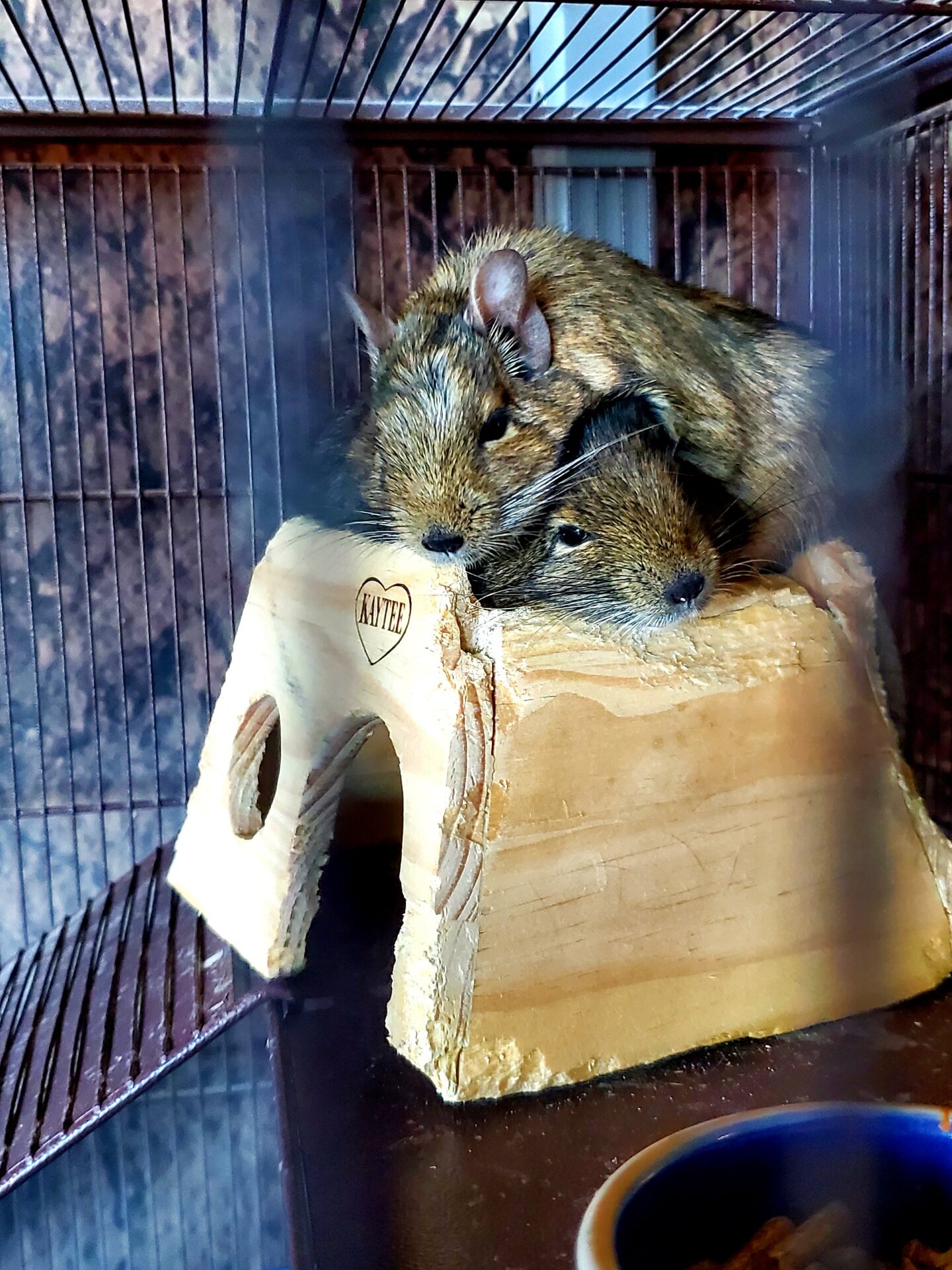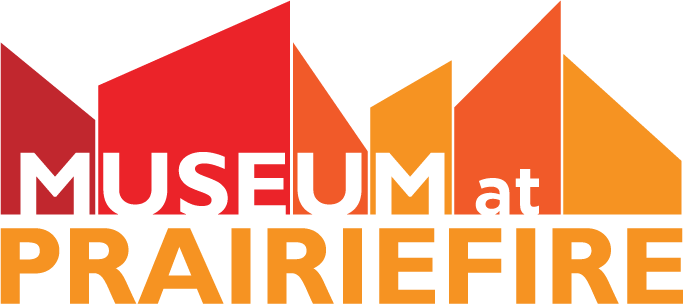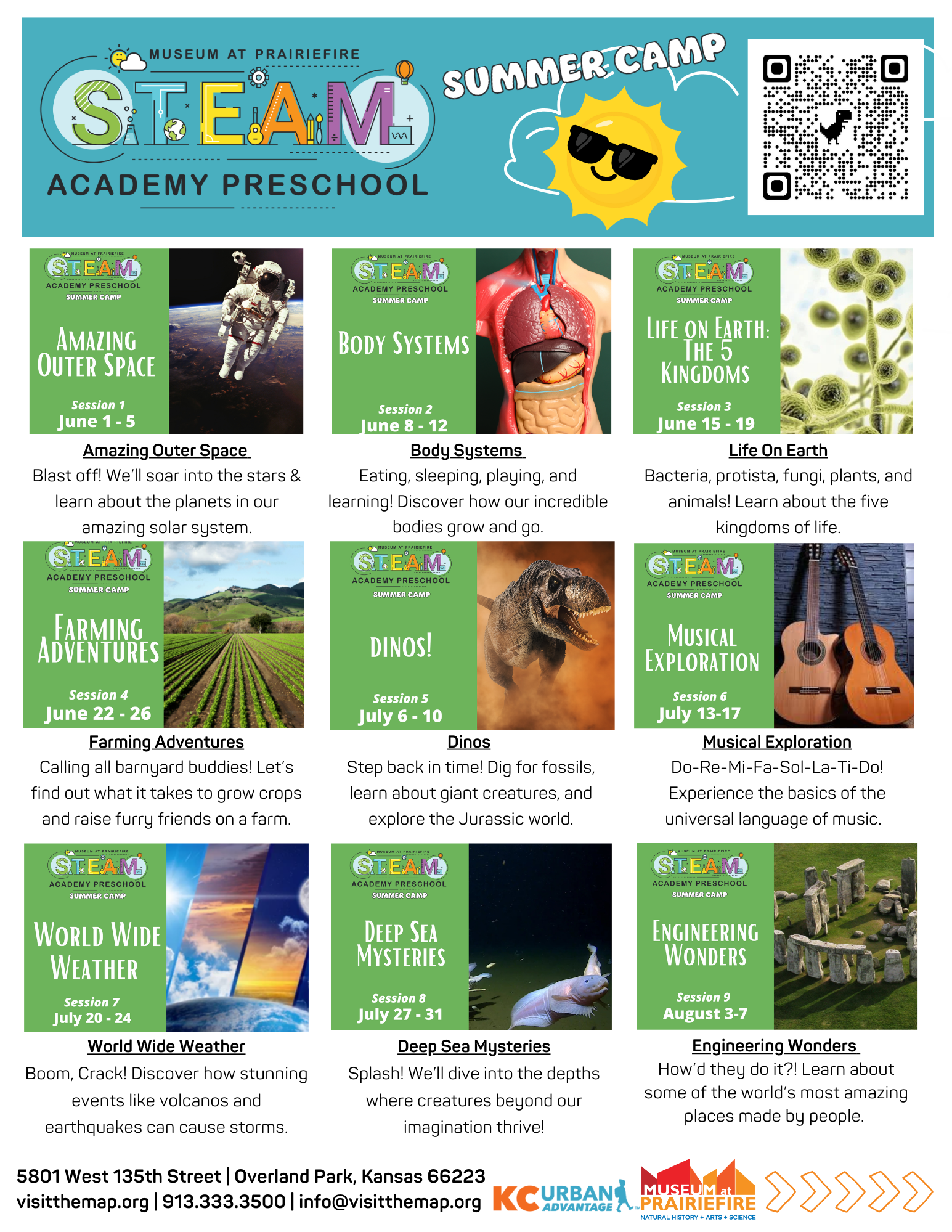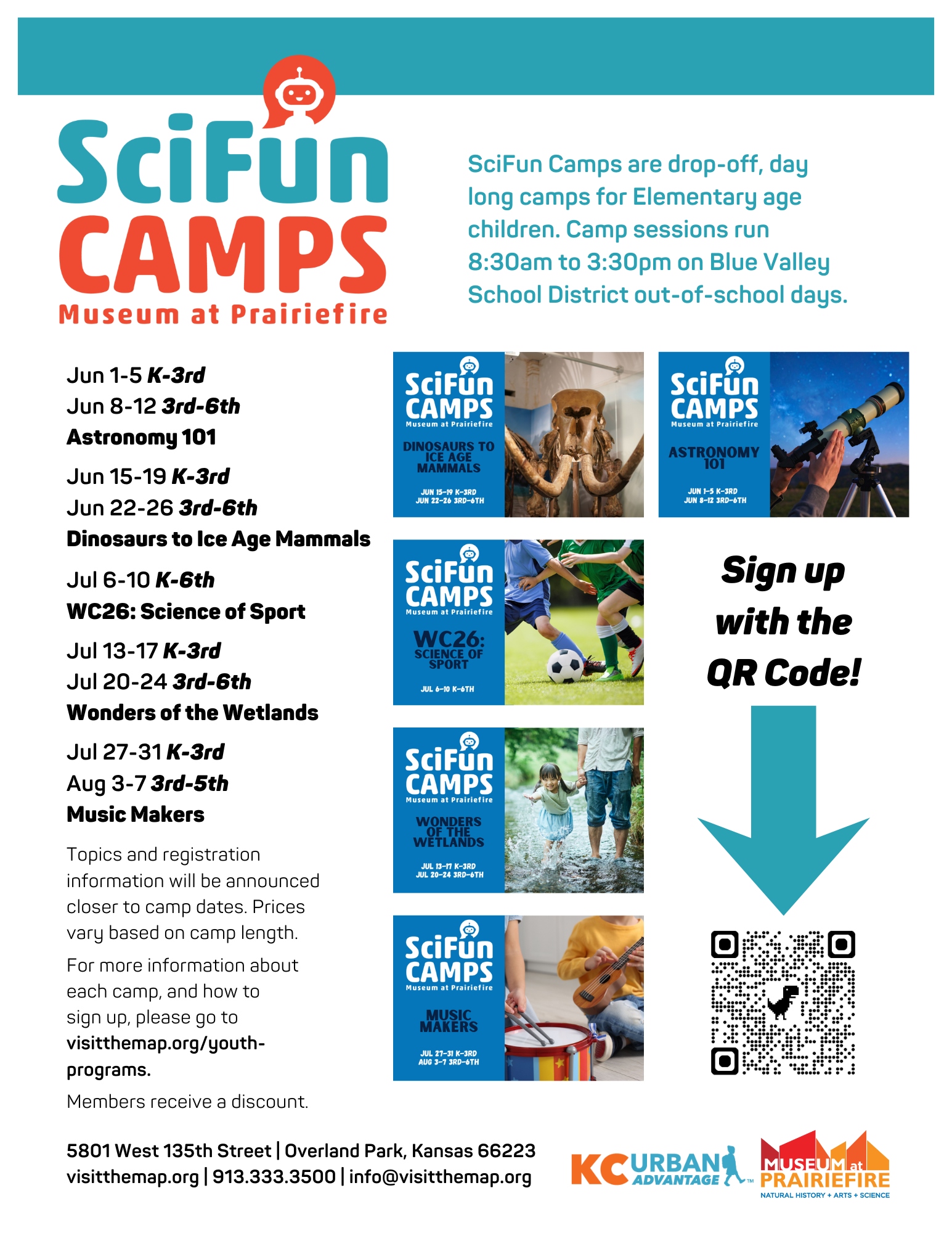Little Explorer’s Club
Ages 3-5
These fun-filled 45-minute sessions guide children through a STEAM topic with Museum Science Educators. Each exploratory session includes story time, an activity or experiment, artifact or animal encounters, and a craft. Little Explorer’s Club take place twice per month. Registration in advance is highly encourage as spots are limited.
$5 GENERAL ADMISSION
FREE FOR MEMBERS
Come visit a time in the earth’s history when a large part of the world was covered with ice! How did animals, plants, and early humans stay warm in the ice age? Find out on this Little Explorer’s Club adventure all about the Ice Age and even experiment with some glacier goo!
Class starts at 10:15 am
Jan 27, 29, & 31
Did you know decomposers are small creatures in our environment that eat all of nature’s trash!? Come with us on this Little Explorers Club adventure as we learn about decomposers and how they help us! See some of the museum’s own decomposers and some you might find in your backyard!
Class starts at 10:15 am
Feb 10, 12, & 14
Roar into learning at Little Explorers Club: Dinosaurs! Young adventurers will discover fascinating dino facts and create their own themed craft in this fun, hands-on session.
Class starts at 10:15 am
Feb 24, 26, & 28th
Join us for Little Explorers Club: Animal Homes! Children will explore the amazing places animals build and call home, then make a creative craft inspired by what they learn.
Class starts at 10:15 am
March 10, 12 & 14
Join us for Little Explorers Club: Animal Adaptations! Young explorers will discover how animals survive and thrive in the wild, then make a fun hands-on craft inspired by what they learn. Perfect for curious kids and families!
Class starts at 10:15 am
March 24, 26 & 28
Bounce into discovery! At Little Explorers Club: Bouncy Balls, children will make their own bouncy ball craft while learning the fun science behind how they’re formed.
Class starts at 10:15 am
Apr 7, 9 & 11
Explore and create! Young scientists will learn about Moon craters and make a fun, hands-on craft in Little Explorers Club: Crazy Craters on the Moon.
Class starts at 10:15 am
Apr 21, 23 & 25
Join us for a hands-on adventure learning about animal defenses and crafting your own nature-inspired creation.
Class starts at 10:15 am
May 5, 7 & 9
What is the difference between weathering, erosion, and deposition and what land formations do they cause? Join us on this Little Explorer’s Club adventure as we learn about being a geologist!
Class starts at 10:15 am
May 19, 21 & 23
Have you ever wondered why snot and boogers stick together? The answer is polymers! Come join us on this Little Explorers Club as we learn all about what snot and boogers are and how they relate to polymers and even make your own stretchy snot polymer.
Class starts at 10:15 am
June 2, 4 & 6
Summer Solstice is the day where the Earth is the most tilted towards the Sun and changes the amount of sunlight we see. This occurs in June in the Northern Hemisphere and in December in the Southern Hemisphere! Join this Little Explorers Club to learn even more about our amazing Sun!
Class starts at 10:15 am
June 16, 18 & 20
Young explorers will dive into the wonders of the night sky! Make your own telescope craft and discover the stars, planets, and galaxies in a hands-on learning adventure.
Class starts at 10:15 am
July 14, 16 & 18
Young explorers will dig into the world of fossils! Make a fun craft and discover how fossils tell the story of life long ago.
Class starts at 10:15 am
July 28, 20 & Aug 1
Join us for a chilly adventure as we learn how animals like polar bears stay warm in icy places! Preschool-aged children will explore the science behind fur and blubber, then get creative by making their very own polar bear paintings to take home. Perfect for curious little minds and busy hands!
Class starts at 10:15 am
Dec 9, 11 & 13
PLEASE NOTE:
We require a 24 hour cancellation notice for Little Explorers Club and JAM Sessions reservations via emailing info@visitthemap.org. Please include the name on the reservation, number of students, date and time of the class.
Please help create an outstanding learning environment by limiting disruptions in the classroom!
Parents are, of course, always welcome to remain in class but should a parent choose to step out, we have provided a seating area just outside the classrooms. Parents and siblings are also welcome to explore our Discovery Room or the rest of the Museum until the class concludes.
STEAM Camps
Preschool Learners (ages 3-5)
Our STEAM Camps provide an engaging, hands-on learning experience for potty-trained students ages 3 to kindergarten-ready. With small class sizes of just 15 students and 2 educators, we ensure a nurturing environment with individualized attention. Children who have attended kindergarten must enroll in our SciFun Camps, which offer more advanced STEAM activities tailored for older learners. Please stay tuned for winter and spring break camps!
Cancellation policy:
More than 4 weeks before the camp date: Refund 100% - $10 admin fee
4 weeks - 8 days before camp: Refund 50% - $10 admin fee
Within 7 days of camp: 0% refund
The STEAM Academy has the right to discontinue service to a family if it becomes apparent that the program is not equipped to meet the psychological or developmental needs of the child. The staff/director will make every effort to resolve any problems prior to termination. Parents and children will be given as much notification in advance as possible if suspension must take place based on the child's behavior. However, if a child threatens the well being of another child, educator, and/or animal, immediate suspension may be necessary.
JAM Sessions
Elementary Learners
Junior Adventurers at the Museum (JAM) Sessions engage elementary students in fun, hands-on inquiry-based activities to familiarize students with STEM-essentials. Experiments and crafts are sure to feed any child’s curiosity. JAM Sessions take place twice per month. Registration in advance is highly encourage as spots are limited
$5 GENERAL ADMISSION
FREE FOR MEMBERS
Have you ever wanted to play an instrument and sound like some of the jazz greats? In this activity, you have the opportunity to do just that. A membranophone is a musical instrument that produces sounds a bit like a cross between a saxophone and a clarinet, is made of readily available materials, and is fun to make and play.
Class is at 10:15 am
Jan 10 & 15
A hovercraft is a vehicle or craft that travels over land, water, mud, ice, and other surfaces on a cushion of air. They are used throughout the world as specialized transports in disaster relief, guarding coastal areas, and in military and survey applications, as well as for sport or passenger service. In this JAM, you will make and be able to operate a simple version of a hovercraft to understand how it works.
Class is at 10:15 am
Jan 24 & 29
In this fun-filled and colorful activity, JAM kids are challenged to build the tallest wall possible using only Valentine candy hearts. Once they have finished constructing their tallest wall, they will test it to see if it is wind-proof.
Class is at 10:15 am
Feb 7 & 12
Here’s an opportunity to make your own homemade, silly putty or super ball and have a fun time learning a little about chemistry.
Class is at 10:15 am
Feb 21 & 26
Design your own Mars landing vehicle for an egg using materials provided by the MAP. JAMers think about the best way to protect an egg as it lands on Earth and then design a landing vehicle using the available materials provided by the MAP, then test their landing vehicles.
Class is at 10:15 am
Mar 7 & 12
Ever wonder what’s inside a flower and why bees and other pollinators are attracted to them? In this activity, JAM participants will take apart a daffodil or other early spring flower to develop an understanding of the pollination process and why it is vital to flowering plants and animals that assist in this process.
Class is at 10:15 am
Mar 21 & 26
In this JAM activity participants will be out in the wetland part of the time and inside the Museum the rest of the time building their engineering and science skills. They will learn how to make wildflower seed bombs, then engineer a seed cannon to help launch those seed bombs into the wetland. During the year, participants will enjoy watching new wildflowers grow from seed and seeing all the incredible insects that call their new flowers home.
Class is at 10:15 am
Apr 4 & 9
In this life-science JAM, participants conduct an experiment to determine whether seeds will sprout faster in coffee or water and will learn a little about how seeds turn into plants.
Class is at 10:15 am
Apr 18 & 23
In this JAM, participants will use natural and man-made raw materials to simulate the way birds use these materials to build their nests. In the process of doing this simulation, JAMmers will realize how much work it is for a bird to build a nest.
Class is at 10:15 am
May 2 & 7
In this session of JAM, participants will learn how to identify and name common trees in the Kansas City Metro using the characteristics of leaf shape and arrangement, tree bark, and shape of the canopy. Weather permitting, participants will practice their identification skills in the wetland area of the Museum or indoors using images arranged on a Powerpoint presentation.
Class is at 10:15 am
May 16 & 21
We all rely on clean, drinkable water to survive. (Remember that most of our body is water.) The water in our bodies must be replenished by drinking plenty of it during the day. How do we get water that we can drink? The water that comes to us from our environment is not usually drinkable—it must be treated to remove harmful substances in it. One type of treatment involves filtration. Filtration removes substances and microscopic organisms that float in the water, as well as some substances that are dissolved in it. Using materials from the pet and hardware stores, you can construct your own water filtration device to see how this treatment process works.
Class is at 10:15 am
May 30 & June 4
When you think of a wetland (maybe a marsh, swamp, or small creek flowing from a pond), what living things come to mind? Most participants can probably name a few large animals and at least one or two plants. But, did they know that these large living organisms actually depend on tiny, even microscopic, plants and animals to survive. Without them, a wetland would not function the way it does. In this natural science JAM, partici- pants will each be given some sampling tools for collecting water samples and other natural materials in the stream behind the Museum. They will observe their “catch” through magnifiers and microscopes and learn about the amazing tiny things living and swimming in the creek!
Class is at 10:15 am
June 13 & 18
In this life-science JAM, participants will celebrate the fourth of July using food dye to create colorful carnations and learn about how plants use water.
Class is at 10:15 am
July 11 & 16
In this simple STEAM activity, children use the path of the Sun across the southern sky to tell time using a simple version of a sundial. As an introduction to the activity, tell children that before there were watches, clocks, or computers that would tell us the time, humans had to rely on sundials.
Class is at 10:15 am
July 25 & 30
Anybody up for some ice cream? Following the steps in this activity, you can make your own. July is a great time to enjoy some cold, refreshing ice cream. As with any kind of cooking and food making, there is science involved. There are chemical changes that happen when making ice cream, such as changes of state and the effect of adding substances that lower the freezing temperature of water. And in the end, you get to eat your science!
Class is at 10:15 am
Aug 8 & 13
SciFun Camps
Elementary School Learners
School year SciFun Camps are drop-off, single- or multiple-day-long camps with science-oriented experiments and activities designed for elementary-age students. Our Lead Educator designs curricula for facilitating these activities with the intention that the students will participate expectedly and learn concepts as well as enjoy the activities. During the school year, camps run from 8:30 am to 3:30 pm on select Blue Valley School District out-of-school days. Prices vary based on camp length; see individual camps for more information. Members receive a discount. First semester dates for the 2025-2026 school year are:
Friday, August 29th
Friday, September 26th
Friday, October 10th
Thursday & Friday, October 23-24
Friday, November 7th
Monday, November 10th
Monday & Tuesday, November 24th & 25th
Friday, December 5th
Cancellation policy:
More than 4 weeks before the camp date: Refund 100% - $10 admin fee
4 weeks - 8 days before camp: Refund 50% - $10 admin fee
Within 7 days of camp: 0% refund
What is a simple machine, you ask. Simple machines form the basis of much of the technology that goes into everything from nuts and bolts to the International Space Station. Join us for a day as we explore these simple devices and perhaps spark your imagination of what you could use these devices for to make your life easier.For elementary school ages.
$50 Non-Members
$40 Members (please sign in to your account and use the discount code emailed to you)
If registering multiple children, please add them to the cart one at a time.
January 19th (Monday)
Drop-off for camps is from 8:00-8:20 am and pick-up is from 3:30-4:00 pm. Please email education@visitthemap.org with any questions.
A grandparent might have told us that our Moon is really made of green cheese. Is that true? What’s it like to be on the Moon? Why does the Moon’s shape change throughout the month? Why does the Moon have a dark side? We’ll explore these questions and more in the camp for young scientists.
$50 Non-Members
$40 Members (please sign in to your account and use the discount code emailed to you)
If registering multiple children, please add them to the cart one at a time.
January 30th (Friday)
Drop-off for camps is from 8:00-8:20 am and pick-up is from 3:30-4:00 pm. Please email education@visitthemap.org with any questions.
Humans have enjoyed music for a long time, but what kinds of music were they making in prehistoric civilizations? What makes different instruments produce different sounds? In this camp, we will explore different ways people have made music throughout history, and how different instruments work.
$100 Non-Members
$80 Members (please sign in to your account and use the discount code emailed to you)
If registering multiple children, please add them to the cart one at a time.
February 12th & 13th (Thursday & Friday)
Drop-off for camps is from 8:00-8:20 am and pick-up is from 3:30-4:00 pm. Please email education@visitthemap.org with any questions.
Some of the wildest and strangest creatures around us are invertebrates, but many of them look nothing alike. In this camp, we will discover the similarities between many invertebrates, what makes them unique, and how they fit into their ecosystems.
$50 Non-Members
$40 Members (please sign in to your account and use the discount code emailed to you)
If registering multiple children, please add them to the cart one at a time.
February 16th (Monday)
Drop-off for camps is from 8:00-8:20 am and pick-up is from 3:30-4:00 pm. Please email education@visitthemap.org with any questions.
Wind, water, and gravity act on and modify Earth’s surface 24/7, 365 days of the year. Some of the time, how they act is helpful to humans, but at other times, they can be harmful, such as during flooding. In this one day camp, we will explore how these movers and shakers modify the Earth and how we can enhance their beneficial effects and reduce their harmful effects on our lives.
$50 Non-Members
$40 Members (please sign in to your account and use the discount code emailed to you)
If registering multiple children, please add them to the cart one at a time.
February 27th (Friday)
Drop-off for camps is from 8:00-8:20 am and pick-up is from 3:30-4:00 pm. Please email education@visitthemap.org with any questions.
It’s almost Spring! Daylight is getting longer and the days are getting warmer. What causes Spring? And how does nature respond to these changes? We’ll explore these and other questions in this fun-filled camp for young scientists.
$50 Non-Members
$40 Members (please sign in to your account and use the discount code emailed to you)
If registering multiple children, please add them to the cart one at a time.
March 13th (Friday)
Drop-off for camps is from 8:00-8:20 am and pick-up is from 3:30-4:00 pm. Please email education@visitthemap.org with any questions.
During this five-day camp, children will tour the world virtually looking at various ecosystems and then will spend the rest of the camp conducting experiments to better understand how soil, water, plants, animals interact to create the local ecosystems we see in our parks and other natural areas.
$250 Non-Members
$200 Members (please sign in to your account and use the discount code emailed to you)
If registering multiple children, please add them to the cart one at a time.
March 16th-20th (Monday-Friday)
Drop-off for camps is from 8:00-8:20 am and pick-up is from 3:30-4:00 pm. Please email education@visitthemap.org with any questions.
What is a rock and how is it different from a mineral? What will help me identify rocks and minerals? What kinds of rocks and minerals can you find in the Kansas City Metro? Children will explore these questions and other related topics in this one-day camp.
$50 Non-Members
$40 Members (please sign in to your account and use the discount code emailed to you)
If registering multiple children, please add them to the cart one at a time.
March 23rd (Monday)
Drop-off for camps is from 8:00-8:20 am and pick-up is from 3:30-4:00 pm. Please email education@visitthemap.org with any questions.
The weather is warming up, and plants and animals everywhere have emerged from their winter slumber. You may know that April 22nd is called Earth Day. It is a day to celebrate nature. Through a series of guided experiences, campers will learn about how conservation of natural resources and recycling of waste materials can help minimize habitat destruction. Campers will tour the wetlands outside of the museum to identify its natural resources and how they benefit local wildlife and will conduct a cleanup to remove waste products left behind by others.
$50 Non-Members
$40 Members (please sign in to your account and use the discount code emailed to you)
If registering multiple children, please add them to the cart one at a time.
April 10th (Friday)
Drop-off for camps is from 8:00-8:20 am and pick-up is from 3:30-4:00 pm. Please email education@visitthemap.org with any questions.
What is weather and how is it different from climate? What tools do weather- men use to gather data on today’s weather? How do they use data to predict the weather? In this one-day camp, we will answer these and other questions about weather.
$50 Non-Members
$40 Members (please sign in to your account and use the discount code emailed to you)
If registering multiple children, please add them to the cart one at a time.
April 20th (Monday)
Drop-off for camps is from 8:00-8:20 am and pick-up is from 3:30-4:00 pm. Please email education@visitthemap.org with any questions.
How are dinosaurs different from other animals? Were dinosaurs all alike? How did they take over the world’s continents? How did some dinosaurs become birds? Year after year, we learn more about how these animals relate to one another and how they lived. In this camp, children will learn what modern technology has revealed about the lives of these creatures and how they relate to each other in the dinosaur family tree and to other animal groups.
$50 Non-Members
$40 Members (please sign in to your account and use the discount code emailed to you)
If registering multiple children, please add them to the cart one at a time.
May 1st (Friday)
Drop-off for camps is from 8:00-8:20 am and pick-up is from 3:30-4:00 pm. Please email education@visitthemap.org with any questions.
PLEASE NOTE:
We require a 24 hour cancellation notice for Little Explorers Club and JAM Sessions reservations via emailing info@visitthemap.org. Please include the name on the reservation, number of students, date and time of the class.
Please help create an outstanding learning environment by limiting disruptions in the classroom!
Parents are, of course, always welcome to remain in class but should a parent choose to step out, we have provided a seating area just outside the classrooms. Parents and siblings are also welcome to explore our Discovery Room or the rest of the Museum until the class concludes.
Summer SciFun Camps
Elementary & Middle School Learners
Summer SciFun camps are drop-off, day long weekly camps with science oriented experiments and activities designed for elementary and/or middle school age students. Our Lead Educator designs curricula for facilitating these activities with the intention that the students will participate expectedly and learn concepts as well as enjoy the activities. Grade levels are determined by the grade the student will be entering in fall. During the Summer camps run from 9:00 am to 3:00 pm.
$275 Non-Members | $250 Members
Cancellation policy
Before May 1st: Refund 100% - $10 admin fee
May 1st to 8 days before the 1st date of Camp: Refund 50% - $10 admin fee
Within 7 days of the first day of camp: 0% refund
If a camp is sold out, please contact education@visitthemap.org or 913-333-3502 to be added to the waitlist.

Animal Encounters
Join us Tuesdays, Thursdays, and Saturdays to get an up close look at some of the animals in our Discovery Room!
Each animal encounter lasts approximately 15 minutes and is included in the price of admission.
Please visit our “Animal Encounters” page for exact time and animals.


Options for Homeschooling families
We are happy to offer programs exclusively designed for and dedicated to Homeschooling families.
Contact Sadie Holloway with any questions.
education@visitthemap.org
(913) 333-3502
Custom Field Trips
You can plan your own educational, facilitated field trip at the MAP for your homeschooling needs! Visit the Field Trips section of the website by clicking the button below, and fill out a form to make your request and let us know about your vision for your student’s field trip!
SciFun Camps
Homeschool students are welcomed to attend any of our SciFun camps.
Programs
Choose a Little Explorers Club or JAM session program suited for your student’s age group, pick a topic, and get ready for an engaging, learning session led by Museum at Prairiefire experts. This is perfect for those looking to add diversity to an at-home curriculum.












































These mammals have some unique characteristics in the world of just mammals. Come learn with us on this adventure about mammals that lay eggs, have armored plates and even make your own hedgehog!
Class starts at 10:15 am
Jan 13, 15, & 17